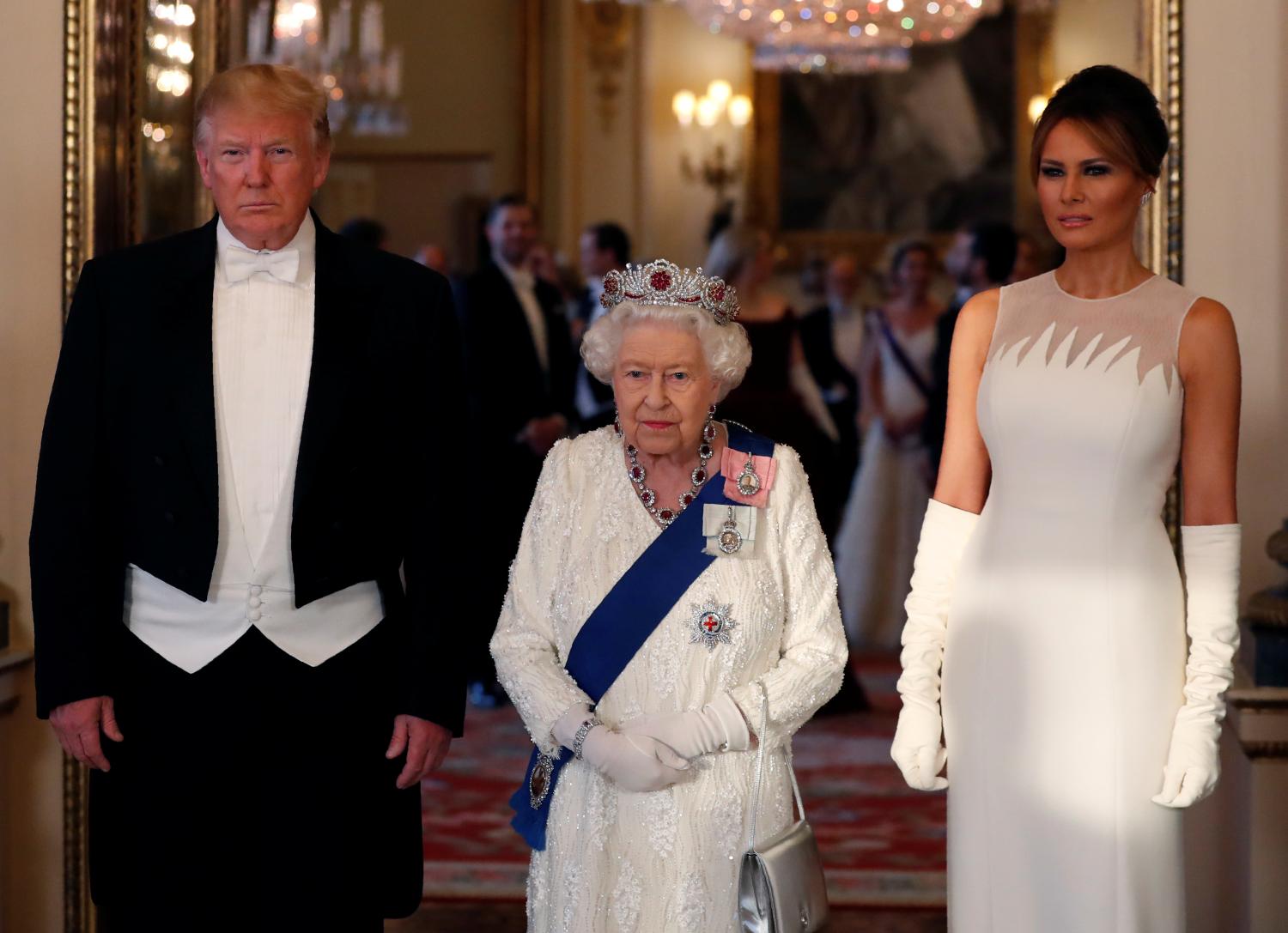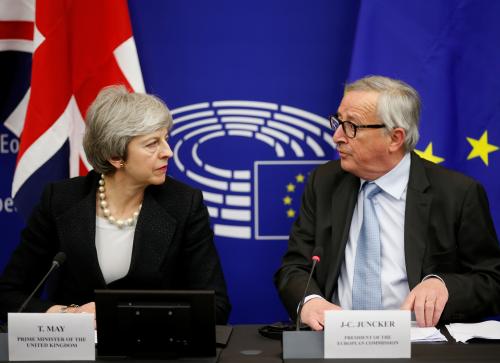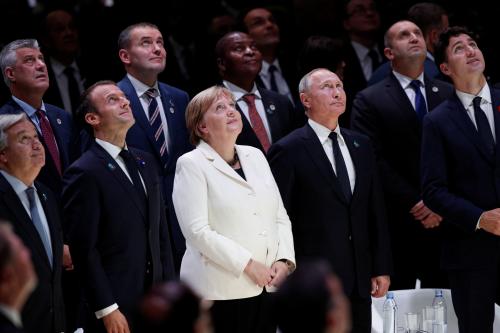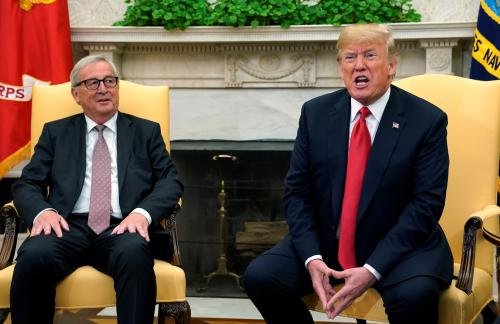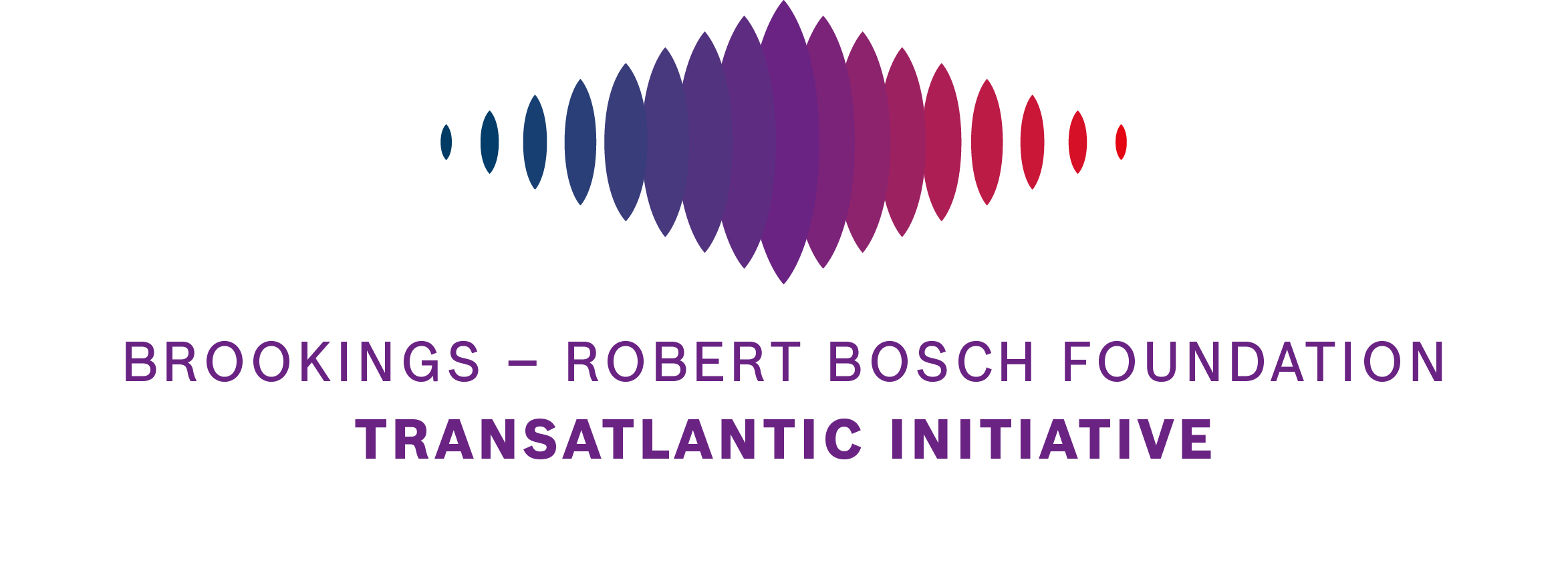 Welcome to the fourth edition of the Trans-Atlantic Scorecard, a quarterly evaluation of U.S.-European relations produced by Brookings’s Center on the United States and Europe (CUSE), as part of the Brookings – Robert Bosch Foundation Transatlantic Initiative. To produce the Scorecard, we poll Brookings scholars and other experts on the present state of U.S. relations with Europe—overall and in the political, security, and economic dimensions—as well as on the state of U.S. relations with five key countries and the European Union itself. We also ask about several major issues in the news. The poll for this edition of the survey was conducted July 8-11, 2019. The experts’ analysis is complemented by a Snapshot of the relationship over the previous three calendar months, including a timeline of significant moments, a tracker of President Trump’s telephone conversations with European leaders, figures presenting data relevant to the relationship, and CUSE Director Thomas Wright’s take on what to watch in the coming months.
Welcome to the fourth edition of the Trans-Atlantic Scorecard, a quarterly evaluation of U.S.-European relations produced by Brookings’s Center on the United States and Europe (CUSE), as part of the Brookings – Robert Bosch Foundation Transatlantic Initiative. To produce the Scorecard, we poll Brookings scholars and other experts on the present state of U.S. relations with Europe—overall and in the political, security, and economic dimensions—as well as on the state of U.S. relations with five key countries and the European Union itself. We also ask about several major issues in the news. The poll for this edition of the survey was conducted July 8-11, 2019. The experts’ analysis is complemented by a Snapshot of the relationship over the previous three calendar months, including a timeline of significant moments, a tracker of President Trump’s telephone conversations with European leaders, figures presenting data relevant to the relationship, and CUSE Director Thomas Wright’s take on what to watch in the coming months.
Snapshot
Timeline
- April 1
- The U.K. Parliament held a second round of indicative votes to assess support for alternative approaches to Brexit, with no option earning a majority. A customs union was defeated most narrowly (273 in favor to 276 against) while a second referendum received the most votes in favor (280-292).
- April 2
- In New York, German Foreign Minister Heiko Maas and French Foreign Minister Jean-Yves Le Drian announced they will launch an Alliance for Multilateralism at the United Nations General Assembly in September.
- April 3
- NATO Secretary General Jens Stoltenberg addressed a joint session of Congress on the occasion of NATO’s 70th anniversary. “NATO lasts because it is in the national interest of each and every one of our nations,” he told Congress. “Together, we represent almost one billion people. We are half of the world’s economic might. And half of the world’s military might. When we stand together, we are stronger than any potential challenger—economically, politically and militarily… Since we cannot foresee the future, we have to be prepared for the unforeseen. We need a strategy to deal with uncertainty. We have one. That strategy is NATO.”
- April 4
- NATO foreign ministers met in Washington, stating “we remain committed to all three aspects of our 2014 Wales Defence Investment Pledge, including the spending guidelines for 2024, planned capabilities, and contributions to missions and operations. We have made considerable progress but we can, must, and will do more.”
- April 8
- Matteo Salvini, Italy’s deputy prime minister and interior minister and leader of right-wing League, announced a new far-right alliance for European Parliament elections, the European Alliance of Peoples and Nations, with the Alternative for Germany’s lead candidate Jörg Meuthen and others. In June, following the elections, the group was renamed Identity and Democracy.
- April 8
- Romania charged its former president Ion Iliescu with crimes against humanity in the country’s December 1989 revolution. 862 people were killed after Iliescu and the National Salvation Front took control after communist dictator Nicolae Ceaușescu fled Bucharest. Iliescu served as president until 1996 and then again from 2000 to 2004, a period in which Romania joined NATO.
- April 10
- At an extraordinary summit, in response to Prime Minister May’s April 5 request for a second Brexit extension to June 30, the European Council offered the United Kingdom a delay of Brexit to as late as October 31. May accepted, averting a no-deal exit from the EU on April 12.
- April 11
- WikiLeaks’ Julian Assange was expelled from the Ecuadorian Embassy in London, where he has lived since 2012, when Quito granted him asylum. He was arrested by Scotland Yard, and a 2018 indictment against him was unsealed, revealing he is charged with conspiracy with Chelsea Manning to crack a Defense Department computer password to download classified documents.
- April 17
- U.S. Speaker of the House Nancy Pelosi, leading a bipartisan delegation to the United Kingdom and Ireland, addressed the Irish parliament, stating, “Let me be clear. If the Brexit deal undermines the Good Friday accords, there would be no chance of a U.S.-U.K. trade agreement.”
- April 18
- The redacted text of Special Counsel Robert Mueller’s report on the investigation into Russian interference in the 2016 U.S. presidential election was published. The report detailed the “sweeping and systematic fashion” of Russian interference and “identified numerous links between the Russian government and the Trump Campaign.” The investigation “established that the Russian government perceived it would benefit from a Trump presidency and worked to secure that outcome, and that the Campaign expected it would benefit electorally from information stolen and released through Russian efforts,” but “did not establish that members of the Trump Campaign conspired or coordinated with the Russian government in its election interference activities.” Mueller also investigated President Trump’s actions towards the FBI and Special Counsel investigations into the interference and related matters. Mueller determined not to make a traditional prosecutorial judgment about whether the president had committed obstruction of justice and the report “does not conclude that the President committed a crime,” nor does it “exonerate him.” On March 31, Attorney General William Barr had told Congress that the special counsel’s evidence was “not sufficient to establish that the President committed an obstruction-of-justice offense.”
- April 18
- Northern Irish journalist Lyra McKee was shot dead by New IRA militants while covering rioting in Derry. McKee’s funeral on April 24 was attended by Northern Irish, U.K., and Irish political leaders. On April 26, Prime Minister May and Irish Taoiseach Leo Varadkar announced new talks to quickly “re-establish to full operation the democratic institutions of the Belfast/Good Friday Agreement.”
- April 21
- Volodymyr Zelensky won the Ukrainian presidential election with 73 percent of the vote over incumbent Petro Poroshenko in the second round.
- April 24
- Scottish First Minister Nicola Sturgeon announced she would aim to hold a second independence referendum by the end of the Scottish parliament’s term in May 2021 if the United Kingdom leaves the EU.
- May 1
- Prime Minister May fired U.K. Defence Secretary Gavin Williamson after an investigation into the leaking of the substance of a National Security Council meeting on allowing Huawei a role in building the country’s 5G network. Williamson and several other ministers reportedly opposed the government’s ultimate decision to allow Huawei to supply “non-core” parts. Penny Mourdant was named the United Kingdom’s first female defence secretary.
- May 2
- The U.S. government ended waivers on secondary sanctions imposed in November 2018 for key importers of Iranian oil. While Greece, Italy, and Taiwan had stopped imports since then, China, India, Japan, South Korea, and Turkey had sought a further extension.
- May 3
- President Trump and President Putin spoke on the phone, reportedly discussing Venezuela, North Korea, Ukraine, arms control potentially involving China, and the Mueller report.
- May 3
- President Trump met with Slovak Prime Minister Peter Pellegrini at the White House.
- May 3
- In U.K. local elections, the governing Conservative Party lost 1,333 councilors, and the Labour Party lost 82, while the Liberal Democrats and Greens made notable gains.
- May 5
- In North Macedonia, Stevo Pendarovski, the joint candidate of the governing parties, won the presidential runoff against Siljanovska Dalkova. Pendarovski defended the Prespa Agreement, which was heavily criticized by Dalkova and her conservative opposition party.
- May 6
- Turkey’s High Election Council upheld the AK Party’s challenge to the Istanbul mayoral election outcome and ordered a new election.
- May 6
- U.S. Secretary of State Mike Pompeo delivered a speech in Rovaniemi, Finland at an Arctic Council summit, describing the Arctic as “an arena for power and for competition,” warning Arctic nations of Chinese and Russian behavior, and defending U.S. environmental policy.
- May 8
- U.S. Secretary of State Mike Pompeo delivered a speech in London on the “special relationship,” between the United States and the United Kingdom, which he described as “the beating heart of the entire free world.”
- May 8
- Ireland and the United Kingdom signed a deal to preserve the Common Travel Area (CTA) in case of a no-deal Brexit. The CTA allows British and Irish citizens to work, study, vote, and access social benefits in each other’s jurisdictions.
- May 13
- President Trump met with Hungarian Prime Minister Viktor Orbán at the White House. While the Senate Foreign Relations Committee had issued a bipartisan letter calling on Trump to raise “concern about Hungary’s downward democratic trajectory and the implications for U.S. interests in Central Europe,” Trump praised Orbán as having “done a tremendous job.”
- May 14
- U.S. Secretary of State Mike Pompeo met with President Putin and Russian Foreign Minister Sergey Lavrov in Sochi. On the previous day, Pompeo stopped in Brussels for meetings focused on Iran.
- May 15
- Eighteen nations and 8 technology companies signed the Christchurch Call, which establishes guidelines to combat online extremism. The Trump administration refused to sign the non-binding agreement spearheaded by New Zealand’s Prime Minister Jacinda Ardern and President Macron, citing free speech concerns.
- May 16
- President Trump met with Swiss President Ueli Maurer at the White House.
- May 17
- The U.K. Labour Party pulled out of talks with the Conservative Party on Brexit, leaving the deadlocked state of negotiations unchanged. The collapse of six weeks of discussions resulted in backlash against both parties and exacerbated calls for Prime Minister May’s resignation.
- May 19
- Austrian President Alexander Van der Bellen called for elections in September in response to the resignation of Vice Chancellor and Freedom Party leader Heinz-Christian Strache and the collapse of the coalition government, which were triggered by a video showing Strache offering government contracts to someone posing as a Russian oligarch’s niece in exchange for campaign support.
- May 20
- New Ukrainian President Volodymyr Zelensky dissolved parliament and called snap elections with hopes of consolidating his power.
- May 20
- U.S. Ambassador to Ukraine Marie Yovanovitch, a career diplomat, left her post two months early, reportedly recalled following political attacks by conservative media and one of President Trump’s sons. On June 18, William B. Taylor, who previously served as ambassador in Kyiv from 2006 to 2009, took over as U.S. Chargé d’Affaires.
- May 21
- President Putin, Chancellor Merkel, and President Macron discussed Ukraine in a phone call. The French and German leaders stressed that Russia should create conditions that are favorable for dialogue and be open to ending the conflict in eastern Ukraine.
- May 23
- The U.S. Justice Department announced that Julian Assange has been indicted on 17 counts under the Espionage Act.
- May 24
- Prime Minister May announced that she would resign as the leader of the Conservative Party on June 7. She will stay in power as prime minister until a new leader is selected.
- May 26
- The four-day European Parliament elections concluded. Voter turnout increased for the first time. Pro-EU parties won two-thirds of the seats, though the center-right (European People’s Party) and center-left (Progressive Alliances of Socialists and Democrats) party blocs lost seats to the liberals and the greens. However, right-wing nationalist parties won the most seats in four of the six largest countries—France, Italy, Poland, and the United Kingdom.
- May 27
- Austrian Chancellor Sebastian Kurz lost a no-confidence vote in parliament. Days later, President Alexander Van der Bellen appointed constitutional court president Brigitte Bierlein to lead a caretaker government until elections in September.
- May 27
- Liviu Dragnea, the head of Romania’s ruling Social Democratic Party, was sentenced to three and a half years in prison for procuring fake jobs for two party employees.
- May 30
- Chancellor Merkel spoke at Harvard University’s commencement. She encouraged the graduating class to reject nationalism and instead, embrace truth, multilateralism, openness, and empathy.
- May 31
- U.S. Secretary of State Mike Pompeo met Chancellor Merkel and German Foreign Minister Heiko Maas in Berlin, several weeks after canceling a Germany stop on a previous trip to Europe. Pompeo continued to Switzerland and the Netherlands before joining President Trump in London.
- June 2
- German Social Democratic Party leader Andrea Nahles announced her resignation following a third-place finish in the European Parliament election, raising fears about the stability of the country’s governing coalition.
- June 2
- Walter Lübcke, a regional politician from Chancellor Merkel’s Christian Democratic Union and a prominent supporter of her refugee policy, was found dead in his home in Kassel, killed by a gunshot to the head. A far-right extremist confessed to the murder before later retracting the confession.
- June 3
- President Trump began a state visit to the United Kingdom, where he met with Queen Elizabeth II, Prime Minister May, and Brexit Party leader Nigel Farage. Ahead of the visit, Trump praised the putative frontrunner for the Conservative leadership contest, former London mayor and foreign secretary Boris Johnson. He spoke with Johnson on the phone on June 4, but Johnson declined an in-person meeting during the visit citing a previous commitment.
- June 5
- President Trump visited Ireland, meeting with Taoiseach Leo Varadkar at Shannon Airport before staying at his own golf resort at Doonbeg.
- June 5
- In Denmark’s elections, the Social Democrats returned to power after four years in opposition while the populist Danish People’s Party lost more than half of its seats in parliament, likely because other parties co-opted its tough stance on immigration. Other major campaign issues included climate change and expanding welfare.
- June 6
- President Trump met with President Macron following a D-Day commemoration ceremony at the Normandy American Cemetery. They discussed topics including Iran and trade.
- June 6
- Russia telecoms company MTS signed a deal with Huawei to develop a 5G network during President Putin’s meeting with President Xi in Moscow.
- June 7
- Prime Minister May resigned as leader of the Conservative Party, triggering the official contest to replace her.
- June 10
- Russian journalist Ivan Golunov was released from jail after charges against him were dropped. The Internal Affairs Ministry announced that there were mistakes made in the leadup to his arrest. Golunov’s imprisonment was widely protested by citizens and the media.
- June 12
- President Trump met with Polish President Andrzej Duda at the White House, where they signed a joint declaration on defense cooperation detailing plans to increase the U.S. military presence in Poland. An F-35 stealth fighter flew over the White House to mark the declaration.
- June 13
- In the first round of voting among Conservative members of Parliament for the party’s leadership contest, Boris Johnson emerged with a strong lead, winning 114 out of 313 votes, with Foreign Secretary Jeremy Hunt finishing second with 43 votes. Seven contenders advanced to the next round of MP voting while three were eliminated.
- June 14
- Spain’s supreme court ruled that former Catalan Vice President Oriol Junqueras will not be allowed to take his seat as a Member of European Parliament until a verdict is issued in the trial about Catalonia’s independence referendum.
- June 14
- Moldovan President Pavel Filip resigned, allowing the country to overcome a political impasse that began after national parliamentary elections did not award a clear majority of seats to any party and resulted in two rival governments. The country now has a single government led by Prime Minister Maia Sandu.
- June 17
- Iran announced that it would exceed the limits on uranium enrichment established by the JCPOA by the end of the month. Meanwhile, U.S. Acting Secretary of Defense Patrick Shanahan announced that the U.S. would send 1,000 additional troops to the Middle East.
- June 17
- Italian Deputy Prime Minister and Interior Minister Matteo Salvini met with U.S. Secretary of State Mike Pompeo and Vice President Mike Pence in Washington. Salvini stated that the United States and Italy had a “common vision” regarding migration, China, Venezuela, Libya, and the Middle East.
- June 18
- President Trump withdrew the nomination of Acting Secretary of Defense Patrick Shanahan to be permanent defense secretary and named Mark Esper, previously secretary of the Army, as acting secretary. Trump nominated Esper for the permanent defense secretary position three days later.
- June 18
- Following comments by European Central Bank President Mario Draghi opening the door to monetary stimulus, the euro weakened against the dollar; President Trump complained this made it “unfairly easier” for Europe to compete against the United States. “They have been getting away with this for years, along with China and others,” Trump tweeted.
- June 20
- In the U.K. Conservative Party leadership contest, Foreign Secretary Jeremy Hunt edged Environment Secretary Michael Gove for second-place in the final round of MP voting. The party’s membership of about 160,000 will choose whether Hunt or frontrunner Boris Johnson will replace Theresa May as party leader and prime minister of the United Kingdom. The ballot will close on July 22, the result will be announced on July 23, and the winner will replace May on July 24.
- June 20
- President Trump reportedly approved and subsequently canceled military strikes on Iran after the Iranians shot down a $130 million U.S. surveillance drone near the boundary of Iran’s territorial waters in the Gulf of Oman.
- June 20
- Thousands of Georgians gathered in front of the parliament in Tbilisi to protest Russian MP Sergey Gavrilov’s visit. Gavrilov chaired a meeting of Orthodox Christian lawmakers while sitting in the speaker’s chair. Georgian President Salome Zourabichvili called Russia an “enemy and occupier” and accused Moscow of meddling in Georgia’s domestic affairs.
- June 21
- President Putin temporarily banned direct flights between Russia and Georgia starting July 8.
- June 23
- An estimated 250,000 people gathered in Prague’s Letna Plain to demand the resignation of Czech Prime Minister Andrej Babiš and Justice Minister Marie Benešová, accusing them of corruption and fraud, in the largest of a running series of protests.
- June 23
- In the re-run of the Istanbul mayoral election, opposition candidate Ekrem İmamoğlu defeated the AK Party’s Binali Yıldırım again, expanding his margin of victory from less than 20,000 votes in March to more than 800,000 votes. The result was a huge defeat for President Erdoğan, who served as mayor of Istanbul before the founding of the AK Party and his rise to national power.
- June 24
- President Trump signed an executive order imposing sanctions on Iranian Supreme Leader Ali Khamenei and his office.
- June 24
- The Court of Justice of the European Union ruled that Poland’s law lowering the retirement age for judges violated EU law and compromised the judiciary’s independence.
- June 25
- Israel hosted a trilateral meeting of the U.S., Russian, and Israeli national security advisors, focusing on Syria.
- June 25
- The parliamentary assembly of the Council of Europe voted to restore Russia’s voting rights, which were removed after the annexation of Crimea. Germany and France had argued for engagement and cited concern that Russian citizens would lose their right to bring cases before the European Court of Human Rights if Russia followed through on its threat to leave the Council. Opponents criticized the decision as sending the wrong message to Moscow.
- June 26
- U.S. Acting Secretary of Defense Mark Esper participated in a NATO defense ministers meeting in Brussels.
- June 28
- At the G20 summit in Osaka, President Trump held bilateral meetings with Chancellor Merkel and President Putin. The agenda for the Trump-Merkel meeting included trade, Iran, West Africa, and counterterrorism. Trump and Putin discussed arms control, Iran, Syria, Venezuela, and Ukraine. Asked by a reporter if he will tell Putin not to meddle in the 2020 election, Trump told Putin “Don’t meddle in the election, President,” and Putin laughed. The two presidents also joked about journalists.
- June 28
- The EU reached a comprehensive trade agreement with Mercosur, a trade bloc consisting of Argentina, Brazil, Paraguay, and Uruguay. European Commission President Jean-Claude Juncker hailed the agreement as the largest trade deal ever concluded by the EU.
- June 29
- At the G20 summit in Osaka, President Trump held a bilateral meeting with President Erdoğan with trade and the Turkish purchase of Russian S-400 missile systems on the agenda.
- June 30
- The EU and Vietnam signed a free trade deal in Hanoi that could eliminate 99 percent of customs duties between the two economies.
Europe on the line
Tracking President Trump’s reported phone conversations with European leaders.
Between April 1 and June 30, 2019, President Trump spoke on the phone with Turkish President Erdoğan twice (April 29, May 29), French President Macron once (April 16), and Russian President Putin once (May 3). He last spoke on the phone with German Chancellor Merkel on March 22, 2019 and with U.K. Prime Minister May on November 9, 2018. Trump also spoke on the phone with May’s likely successor, Boris Johnson, on June 4, during his state visit to the United Kingdom.
 We track Trump’s phone calls with the leaders of France, Germany, Russia, Turkey, and the United Kingdom, whether they have spoken or not, as well as other calls with European leaders of which we are aware. The White House stopped releasing readouts of the president’s calls with foreign leaders in July 2018. If we’ve missed a conversation, please give us a ring. Source: whitehouse.gov, elysee.fr, bundeskanzlerin.de, gov.uk, en.kremlin.ru, tccb.gov.tr/en, press reports.
We track Trump’s phone calls with the leaders of France, Germany, Russia, Turkey, and the United Kingdom, whether they have spoken or not, as well as other calls with European leaders of which we are aware. The White House stopped releasing readouts of the president’s calls with foreign leaders in July 2018. If we’ve missed a conversation, please give us a ring. Source: whitehouse.gov, elysee.fr, bundeskanzlerin.de, gov.uk, en.kremlin.ru, tccb.gov.tr/en, press reports.
Figures
The delayed departure of the United Kingdom from the European Union meant that the country held European Parliament elections along with the 27 other EU member states and sent to Brussels 73 Members of the European Parliament (MEPs) who may only serve for a few months. If the United Kingdom leaves at the end of October or later, the parliament will shrink from 751 seats to 705 seats as had been planned, with other countries sending 27 additional MEPs. After Brexit, the far-right Identity and Democracy group would overtake the Greens-European Free Alliance as the fourth-largest party in the parliament, gaining three seats and 1.1 percent in share of the total seats. The center-right European People’s Party, unrepresented in the United Kingdom, would gain most—five seats and 2.2 percent. Liberal Renew Europe would lose 11 seats and 0.6 percent. The Euroskeptic European Conservatives and Reformists bloc would stay the same size as the four MEPs from Britain’s ruling Conservative Party would be replaced by four new MEPs from other countries.
Seats in the European Parliament are proportional to national population, so EU member state delegations vary greatly in size—from 96 for Germany, 74 for France, and 73 each for Italy and the United Kingdom, to just six each for Cyprus, Estonia, Luxembourg, and Malta. The diminished strength of the two largest party groups in the parliament is in large part due to their weakness in the largest member states. Four of the five largest parties in the parliament, and the largest parties in four of the six largest member states, are nationalist populists—the Brexit Party in the United Kingdom, the League in Italy, Law and Justice in Poland, and National Rally in France—while the center right won in Germany and the center left won in Spain. The four largest countries also sent to Brussels large delegations of liberals and greens as well as Italy’s idiosyncratic populist Five Star Movement. The far-right Alternative for Germany, finishing fourth in Germany on 11 percent of the vote, has more MEPs than the largest party in 21 EU member states. However, in 21 of the 22 member states smaller than Poland, the largest party was a member of European People’s Party (12 countries), the Progressive Alliance of Socialists and Democrats (five countries including Slovakia where the governing Smer-SD actually lost to a liberal-right coalition), or Renew Europe (four countries). In Belgium, the largest of 12 parties winning seats was a member of the European Conservatives and Reformists.
What to watch
Center on the United States and Europe Director Thomas Wright lays out events, issues, and potential developments to watch for in the months ahead.
I am delighted to share with you the fourth edition of the Trans-Atlantic Scorecard, a quarterly evaluation of U.S.-European relations produced by Brookings’s Center on the United States and Europe, as part of the Brookings – Robert Bosch Foundation Transatlantic Initiative.
The latest iteration of the scorecard shows U.S.-Europe relations generally holding steady, but there are a couple of interesting data points related to issues likely to feature prominently in this coming quarter.
The most dramatic shift was the decline in U.S.-U.K. relations, due in part to President Trump’s Twitter campaign against the U.K. Ambassador Sir Kim Darroch (who resigned last week) and the outgoing Prime Minister Theresa May. We will be watching closely to see how Trump gets on with the new British prime minister (most likely to be Boris Johnson). Trump and Johnson do seem to like each other, but it is skin deep.
During the 2016 election, Johnson was scathing in his criticism of Trump, and the American president is known for souring on people quickly. In office, Johnson will have to make a series of tough decisions with regard to the United States—whether to overturn his predecessor’s position on Huawei, whether to add agriculture to U.S.-U.K. free trade talks, and whether to align fully with Washington on Iran and other thorny issues. If he diverges from Trump’s wishes, good feelings may give way to hostile tweets.
We will also be watching personnel changes in the White House to see if they have any impact on America’s Europe policy. My colleague Fiona Hill is leaving after over two years of distinguished service as Special Assistant to the President and Senior Director for European and Russian Affairs. She will be replaced by Tim Morrison, an expert in nuclear weapons and arms control. Does Morrison’s arrival signify a shift away from Western and even Eastern Europe toward arms control negotiations with Russia? (The U.S.-Russia relations score ticked up in this edition of the scorecard).
Finally, we will be watching closely for the U.S. response to the deployment of Russian S-400 air defense systems to Turkey. Will Trump impose new sanctions on Turkey, and what does this mean for the NATO alliance?
Thank you for reading the Trans-Atlantic Scorecard.
Trans-Atlantic Scorecard maintained by Sam Denney, Filippos Letsas, and Ted Reinert. Additional research by Naz Gocek. Digital design and web development by Eric Abalahin, Abigail Kaunda, Yohann Paris, Rachel Slattery, and Cameron Zotter.
The Brookings Institution is committed to quality, independence, and impact.
We are supported by a diverse array of funders. In line with our values and policies, each Brookings publication represents the sole views of its author(s).
